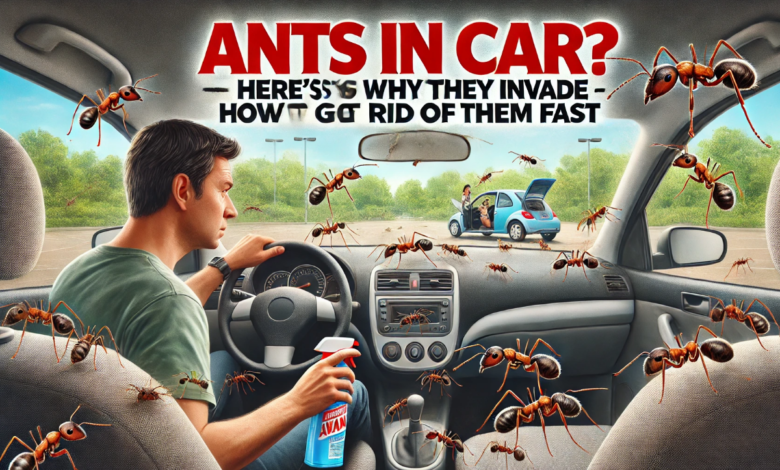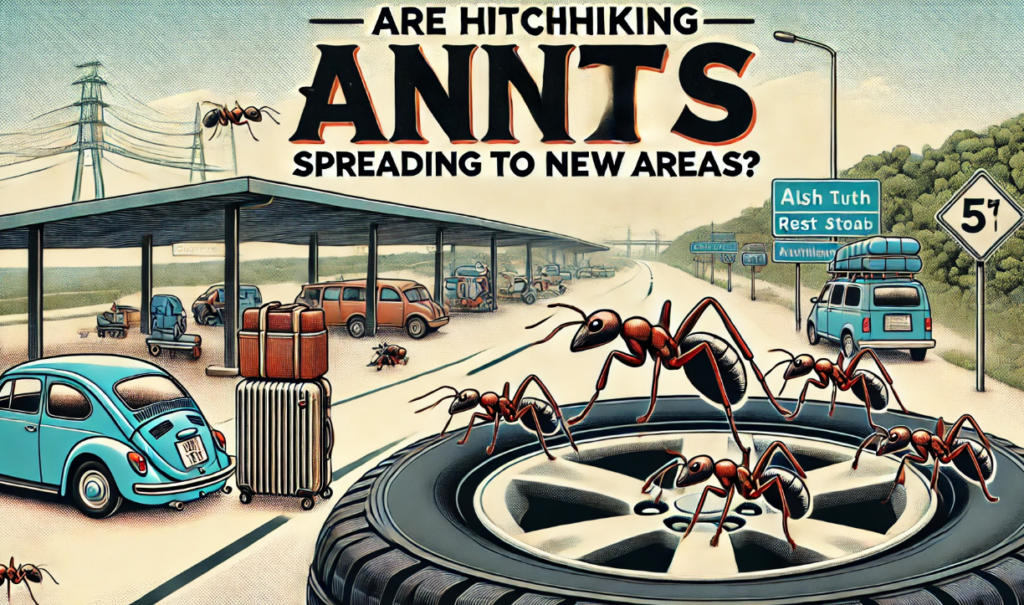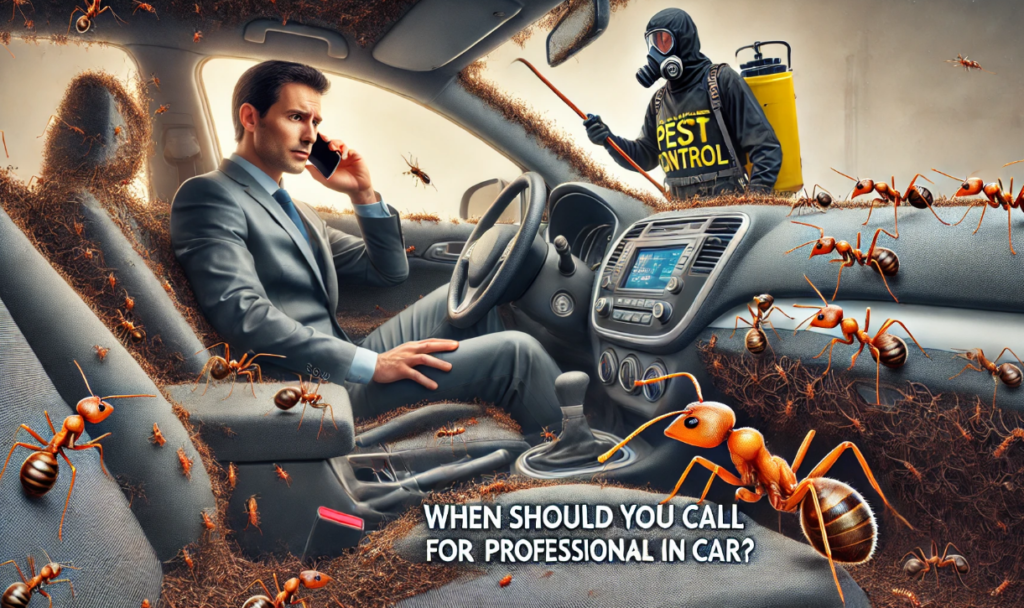Ants in Car? Here’s Why They Invade and How to Get Rid of Them Fast

Ants in Car can be a big headache! You park your car, and the next thing you know, tiny ants are crawling on the dashboard, seats, and even your steering wheel. But why do ants love cars so much?
These little creatures are always looking for food and shelter. If your car has food crumbs, sweet drinks, or even a cozy spot for them to hide, ants will move in. Some ants even hitch a ride to find a new home! But don’t worry—we’ll show you why ants invade cars and the best ways to get rid of them for good.
Why Do Ants Love Your Car? Shocking Reasons!
Ants enter cars for three main reasons: food, shelter, and travel. If your car provides any of these, ants will move in quickly.
Crumbs, spilled drinks, and even tiny food particles attract ants. They follow scent trails left by other ants and soon create a colony. Parking under trees or near ant nests also increases the chances of an ant invasion.
Some ants don’t just visit; they stay. Warm engines and hidden spaces make perfect shelters for them. If they find a good nesting spot inside your car, they may settle down permanently.
Ants can also use cars to move to new places. Invasive ants, like fire ants, often hitch rides on vehicles. This allows them to spread quickly and invade new areas.
Types of Ants That Might Invade Your Car
Different kinds of ants can find their way into your car, and some are more harmful than others.
Common ants like sugar ants, ghost ants, and pavement ants are usually looking for food. They may come and go if you remove what attracts them.
Invasive ants like fire ants and Argentine ants are more dangerous. Fire ants can sting, and Argentine ants build large colonies. Once they settle in, they are harder to remove.
Carpenter ants are another concern. These ants don’t just search for food—they chew through wood and wires. If they get into your car’s interior, they can cause serious damage.
Can Ants in Car Cause Any Real Damage?
Many people ignore ants in their car, thinking they are harmless. But some ants can cause real problems if not removed.
Ants crawling on your dashboard and steering wheel can be distracting while driving. A sudden ant bite or tickling sensation can lead to accidents.
Some ants, like fire ants, sting when disturbed. If they build a nest inside your car, passengers and pets are at risk of painful bites.
Ants can also damage your car. Carpenter ants chew through plastic and wires, leading to electrical issues. Invasive species multiply fast and may create colonies in hard-to-reach areas.
How Do Ants Get Inside Your Car? (Common Entry Points)
Ants are tiny, so they can enter cars through the smallest openings. Understanding how they get in can help prevent infestations.
Doors and windows left slightly open give ants an easy way inside. Even small gaps in rubber seals around windows can be entry points.
Vents and air conditioning systems can also let ants inside. If an ant colony is nearby, they may enter through these openings in search of food.
Parking near trees or grassy areas increases the risk. Ants can crawl onto your tires and move up into the car. They may also climb on through loose panels or cracks in the undercarriage.
Are Hitchhiking Ants Spreading to New Areas?

Ants are now using cars to travel to new places. This is causing a rise in invasive ant species across different regions.
Invasive ants spread quickly because they adapt well to new environments. Once they enter a car, they can travel long distances and establish colonies in new locations.
Experts are studying how ants use vehicles to move. Studies show that personal cars play a bigger role in spreading ants than trucks or cargo transport.
To prevent spreading invasive ants, always check your car before long trips. If you see ants, clean your car thoroughly to remove them before driving to another place.
Step-by-Step Guide to Remove Ants from Car Naturally
If you find ants in your car, don’t panic. Follow these simple steps to remove them without using harsh chemicals.
- Clean the car completely – Remove all food crumbs, wrappers, and spilled drinks. Vacuum seats, floors, and under the seats.
- Use natural ant repellents – Sprinkle cinnamon, lemon juice, or vinegar in areas where ants are active. These smells keep ants away.
- Seal all entry points – Check for gaps in windows, doors, and vents. Use rubber seals or tape to block any openings.
- Move your parking spot – If you always park near an ant colony, try parking somewhere else to break their access.
- Set up ant traps – Place small ant bait stations in the car. These traps attract ants and help get rid of them.
Best Home Remedies to Keep Ants Away from Car Forever
Once you remove the ants, you need to keep them from coming back. Try these simple home remedies to keep your car ant-free.
- Lemon and vinegar spray – Mix lemon juice and vinegar with water and spray it inside your car. The strong smell repels ants.
- Diatomaceous earth – Sprinkle this natural powder around your tires and car floor. It kills ants by drying them out.
- Bay leaves and cinnamon sticks – Place these in your car to keep ants away. They act as natural repellents.
- Essential oils – Peppermint and tea tree oil mixed with water can be sprayed around your car to stop ants from coming in.
Top Mistakes That Attract Ants in Car (Avoid These!)
Many people unknowingly make mistakes that invite ants into their cars. Avoid these common errors to keep your car ant-free.
- Leaving food inside – Even tiny crumbs can attract ants, so always clean up after eating.
- Not sealing entry points – Small gaps in windows and doors let ants inside easily.
- Parking in risky areas – Avoid parking near trees, grassy spots, or garbage bins where ants are active.
- Ignoring early signs – If you see one or two ants, act quickly before a whole colony moves in.
How to Prevent Ants in Car: Pro Tips That Work!
Stopping ants before they invade is the best way to keep your car clean. Here are some expert tips for prevention.
- Regularly clean your car – Vacuum and wipe down all surfaces to remove food particles.
- Use car-friendly repellents – Keep cinnamon sticks, bay leaves, or essential oil sprays inside your car.
- Check your car often – Inspect for ants under the seats, near the engine, and in air vents.
- Change parking spots – If ants are a problem in one area, park somewhere else to reduce the risk.
When Should You Call a Professional for Ants in Car?

Sometimes, ant infestations become too big to handle alone. Knowing when to call a pest control expert can save you time and trouble.
If you have fire ants or carpenter ants inside your car, professional help is recommended. These ants can be aggressive or cause damage.
If natural remedies and cleaning don’t work, an expert can use safe methods to remove ants without harming your car.
Large ant colonies in hidden areas, like the engine or door panels, may need special treatment. A pest control service can remove them completely.
Conclusion
Finding ants in your car can be annoying, but you can get rid of them with the right steps. Ants come into cars looking for food, shelter, or a way to travel. If you keep your car clean, block their entry points, and use natural repellents, you can stop them from coming back.
If ants keep coming even after cleaning, try using ant traps or changing your parking spot. Some ants, like fire ants or carpenter ants, can be dangerous or cause damage. In that case, calling a pest expert might be the best choice. Stay alert, take action early, and keep your car ant-free!
FAQs
Q: Why do ants get into my car?
A: Ants enter cars looking for food, shelter, or a way to travel. Crumbs, sweet drinks, and warm hiding spots attract them.
Q: How do I get rid of ants in my car naturally?
A: Clean your car, remove food, use vinegar or lemon spray, and place cinnamon or bay leaves inside to repel ants.
Q: Can ants in my car cause damage?
A: Yes, some ants chew on wires, plastic, and even car seats. Fire ants can also sting, making them a risk inside your car.
Q: How do I stop ants from coming back to my car?
A: Keep your car clean, seal small openings, park away from ant nests, and use natural repellents like peppermint oil.
Q: When should I call a professional for ants in my car?
A: If ants keep returning, if there’s a large colony, or if you have harmful ants like fire ants, it’s best to call pest control.



